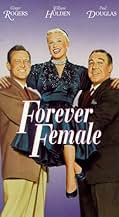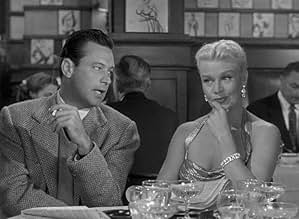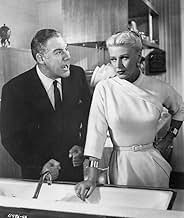AVALIAÇÃO DA IMDb
6,5/10
700
SUA AVALIAÇÃO
Adicionar um enredo no seu idiomaAn aging actress refuses to admit she is too old to play the ingénue role anymore.An aging actress refuses to admit she is too old to play the ingénue role anymore.An aging actress refuses to admit she is too old to play the ingénue role anymore.
- Direção
- Roteiristas
- Artistas
- Prêmios
- 1 vitória no total
Marion Ross
- Patty
- (as Marian Ross)
Brandon Beach
- Diner at Sardi's
- (não creditado)
Paul Bradley
- Actor in Play
- (não creditado)
James Carlisle
- Diner at Sardi's
- (não creditado)
Steve Carruthers
- Theatre Patron
- (não creditado)
Oliver Cross
- Club Patron
- (não creditado)
- Direção
- Roteiristas
- Elenco e equipe completos
- Produção, bilheteria e muito mais no IMDbPro
Avaliações em destaque
This film was made in the shadow of ALL ABOUT EVE, and paints a more benign view of that film's central situation. Ginger Rogers plays a leading Broadway star, who retains a close relationship with her former husband (Paul Douglas), and works closely with playwright William Holden (possibly a softer build-up for his play director in Bing Crosby's/Grace Kelly's THE COUNTRY GIRL). Pat Crowley, a younger woman of some acting talent, is trying to break into the circles that cast and produce Broadway plays (she is doing mostly off-Broadway work). The relationship of these four characters are the basis of this comedy.
There are differences between the situation here and the situation in EVE. There was more of an atmosphere of the theater and it's traditions in EVE (because Joseph Mankiewicz writes literate scripts, and was determined to show what goes on behind the stage curtains). But there Bette Davis has gotten trapped into a lonely greatness on stage, and she turns out to be willing to vacate her pedestal if she can have a human life with Gary Merrill. She just does not like the way Anne Baxter is trying to replace her in her parts - Baxter's underhanded methods are despicable. Crowley is not Baxter. She genuinely admires Rogers, and just wants entry (which she may get through Holden). It is just that Rogers is still clinging to her youth - Holden is her last chance for such a cling when they go out together. But even Rogers realizes that she is beyond the point of return. In fact, towards the end of the film the audience and Holden and Crowley discover that Rogers actually gives herself a long summer vacation where she can wear softer, easier clothing and eat as much as she wants to. In the end she accepts that the scepter is passed, but she still has her old husband/friend/and continuous argument partner Douglass to play with.
There are differences between the situation here and the situation in EVE. There was more of an atmosphere of the theater and it's traditions in EVE (because Joseph Mankiewicz writes literate scripts, and was determined to show what goes on behind the stage curtains). But there Bette Davis has gotten trapped into a lonely greatness on stage, and she turns out to be willing to vacate her pedestal if she can have a human life with Gary Merrill. She just does not like the way Anne Baxter is trying to replace her in her parts - Baxter's underhanded methods are despicable. Crowley is not Baxter. She genuinely admires Rogers, and just wants entry (which she may get through Holden). It is just that Rogers is still clinging to her youth - Holden is her last chance for such a cling when they go out together. But even Rogers realizes that she is beyond the point of return. In fact, towards the end of the film the audience and Holden and Crowley discover that Rogers actually gives herself a long summer vacation where she can wear softer, easier clothing and eat as much as she wants to. In the end she accepts that the scepter is passed, but she still has her old husband/friend/and continuous argument partner Douglass to play with.
A young and cynical writer (William Holden) criticises a stage star who is advancing in years but still popular (Ginger Rogers). In time he begins a relationship with her after he sells his own play to her ex-husband (Paul Douglas). A younger and upcoming actress (Pat Crowley) is also attracted to him and believes a part given to the older actress would be better suited to her.
Based off the play 'Rosalind' by JM Barrie and adapted for the screen by Julius J. and Philip G. Epstein, this film seems to have pretensions at being like ALL ABOUT EVE (1950), but this film it ain't. As a romantic comedy it's okay, but is unlikely to set the world on fire, despite the strengths of the two leads and a good performance by Douglas as the still cuckold ex who gets some of the best dialogue
Based off the play 'Rosalind' by JM Barrie and adapted for the screen by Julius J. and Philip G. Epstein, this film seems to have pretensions at being like ALL ABOUT EVE (1950), but this film it ain't. As a romantic comedy it's okay, but is unlikely to set the world on fire, despite the strengths of the two leads and a good performance by Douglas as the still cuckold ex who gets some of the best dialogue
As an actress I have often admired Ginger Rogers. I am one of the few who think the films she made after the musicals she made with Fred Astaire are better than all that Art Deco Camp that still in some quarters has dominated her reputation. To name two only, ' Storm Warning ' and ' Tender Comrade '. She excelled as a witty serious actress, and when given the chance was riveting to watch. In this film she gives an exceptionally brave performance realising that a woman in the cold world of show business does not have to be, or should be always ' 29 '. Other people have remarked upon the certain similarities with ' All About Eve ' and there are some, especially with the main content being a new and apparently brilliant actress wanting to take her place in a stage play. This film is sexually bolder as Rogers plays a woman who unashamedly has had a sting of younger lovers with her ex-husband still very much an emotional focal point in her life. and she plays this up in many ways that Bette Davis in ' All About Eve ' could not have done. Rogers has a stronger sexual presence and shows it. The other brave aspect is her recognition that time is not on her side and the scenes where she admits that are truly moving, and without histrionics. William Holden is her latest conquest but his acting in the film does not match hers. He is also encumbered with many scenes with the aspiring young actress played very badly by Pat Crowley. She is nowhere in the same range of acting ability as Anne Baxter opposite Bette Davis. I am not sure if Irving Rapper the director was responsible but Pat Crowley was miscast and what could have been a very good film with a fine script loses much of its force and poignancy. I give it an 8 for the script itself, for Paul Douglas as the ex-husband and for the excellent Ginger Rogers.
Charming, slight piece of entertainment sold by it top lined stars and almost scuttled by its featured player.
Ginger Rogers and Paul Douglas are most happily matched as the formerly married couple who are still best friends, a great Broadway star and her producer. Their interchanges are expertly played by two pros who are easy in each others company and really seem like they would have been together for years. Her gentle ribbing of him over back alimony is sweet and believable and actually provides a bit of insight into her character. She doesn't really expect to ever get it but neither does she ever plan to write it off either nor does she let get in the way of their relationship.
William Holden's part is secondary to the story although he is prominently featured due to his star status. He is his usual charismatic self making the minor part much better than it is. One ironic note is that in a story about Ginger Roger's character realizing she's too old for the ingénue role in Holden's play they cast an actor who is too old for his part. The playwright the way he is referenced should be in his early twenties, Holden extremely handsome and youthful though he may be is 35 if he's a day. He can't be held responsible for that since contract actors were routinely assigned parts at the studios whim.
Where the picture runs into trouble is the performance of Pat Crowley in what clearly was planned as a star making part. That didn't happen most probably due to the fact that as directed a more annoying, grating, jejune enactment of a character couldn't be possible. As she constantly proclaims that she is a great talent and better than anyone could imagine you want to push her out of the frame. The actress who did go on to some degree of fame, most notably as the star of TV's Please Don't Eat the Daisies, has proved to be an enjoyable presence elsewhere so the direction must be at fault but she really is hammy and unpleasant here.
Many fine character actors, James Gleason, Jesse White, George Reeves, Maidie Norman etc., add nice little touches throughout and hey look in one short scene its the future Mrs. C herself: Marion Ross just starting out.
A good comedy played by experts just ignore the ham-bone on the side of the action.
Ginger Rogers and Paul Douglas are most happily matched as the formerly married couple who are still best friends, a great Broadway star and her producer. Their interchanges are expertly played by two pros who are easy in each others company and really seem like they would have been together for years. Her gentle ribbing of him over back alimony is sweet and believable and actually provides a bit of insight into her character. She doesn't really expect to ever get it but neither does she ever plan to write it off either nor does she let get in the way of their relationship.
William Holden's part is secondary to the story although he is prominently featured due to his star status. He is his usual charismatic self making the minor part much better than it is. One ironic note is that in a story about Ginger Roger's character realizing she's too old for the ingénue role in Holden's play they cast an actor who is too old for his part. The playwright the way he is referenced should be in his early twenties, Holden extremely handsome and youthful though he may be is 35 if he's a day. He can't be held responsible for that since contract actors were routinely assigned parts at the studios whim.
Where the picture runs into trouble is the performance of Pat Crowley in what clearly was planned as a star making part. That didn't happen most probably due to the fact that as directed a more annoying, grating, jejune enactment of a character couldn't be possible. As she constantly proclaims that she is a great talent and better than anyone could imagine you want to push her out of the frame. The actress who did go on to some degree of fame, most notably as the star of TV's Please Don't Eat the Daisies, has proved to be an enjoyable presence elsewhere so the direction must be at fault but she really is hammy and unpleasant here.
Many fine character actors, James Gleason, Jesse White, George Reeves, Maidie Norman etc., add nice little touches throughout and hey look in one short scene its the future Mrs. C herself: Marion Ross just starting out.
A good comedy played by experts just ignore the ham-bone on the side of the action.
In Forever Female, Ginger Rogers is a Broadway star, still at the top of her game, but not realizing that the times are a changing. Like Norma Desmond she won't believe that there's nothing wrong with being 50 unless you try to act 25.
As this is a comedy, the consequences are not quite as tragic as they are in Sunset Boulevard. Forever Female is however Ginger's reality check.
New playwright William Holden has written a play that's got Ginger excited, a great role for her, maybe 10 to 15 years ago. She insists the role by revised from a 19 to 29 year old. She hasn't lost hold on reality that much.
There's a young ingénue on the scene who might be right for the part and she proves it in a way you have to see Forever Female to find out about. That would be Pat Crowley who was 'introduced' here. Though she never became the bright star of tomorrow, she plays a kinder, gentler Eve Harrington here. Pat Crowley's greatest success would be in the television version of Please Don't Eat the Daisies in the part Doris Day did in film.
All this is proving quite amusing to Rogers's ex-husband and producer Paul Douglas who has some of the best lines in the film.
There's nothing earth shattering about Forever Female, but it did no harm to any of the folks associated with it and still has some laughs for today's audience.
As this is a comedy, the consequences are not quite as tragic as they are in Sunset Boulevard. Forever Female is however Ginger's reality check.
New playwright William Holden has written a play that's got Ginger excited, a great role for her, maybe 10 to 15 years ago. She insists the role by revised from a 19 to 29 year old. She hasn't lost hold on reality that much.
There's a young ingénue on the scene who might be right for the part and she proves it in a way you have to see Forever Female to find out about. That would be Pat Crowley who was 'introduced' here. Though she never became the bright star of tomorrow, she plays a kinder, gentler Eve Harrington here. Pat Crowley's greatest success would be in the television version of Please Don't Eat the Daisies in the part Doris Day did in film.
All this is proving quite amusing to Rogers's ex-husband and producer Paul Douglas who has some of the best lines in the film.
There's nothing earth shattering about Forever Female, but it did no harm to any of the folks associated with it and still has some laughs for today's audience.
Você sabia?
- CuriosidadesSir James M. Barrie's original play, which is a short piece of less than an hour in length, dates from 1912 and is set in a small rural boarding-house "far from London", where a famous actress has elaborately disguised herself as a dowdy middle-aged type in order to escape from adoring admirers and her frantic celebrity lifestyle in the metropolis. As this indicates, this movie adaptation is a very free one.
- Erros de gravaçãoCrux of plot hinges on efforts of a Broadway producer and playwright to find ideal actresses to star in a play about a troubled mother/daughter relationship. Yet when the pair attends a summer stock production of the play, large poster outside theatre only includes photos of actress playing daughter and two male co-stars - completely ignoring actress who plays crucial mother role that's been talked about throughout entire film.
- Citações
Clara Mootz aka Sally Carver: How many drinks have you had, Mr. Phillips?
E. Harry Phillips: Innumerable. And the fact that I can still say "innumerable" suggests that that's nowhere near enough!
- Cenas durante ou pós-créditosIn the end credits, Pat Crowley is billed as "A future Paramount star".
- ConexõesReferenced in Discovering Film: William Holden (2015)
Principais escolhas
Faça login para avaliar e ver a lista de recomendações personalizadas
Detalhes
- Data de lançamento
- País de origem
- Idioma
- Também conhecido como
- Forever Female
- Locações de filme
- Empresa de produção
- Consulte mais créditos da empresa na IMDbPro
- Tempo de duração
- 1 h 33 min(93 min)
- Cor
- Proporção
- 1.37 : 1
Contribua para esta página
Sugerir uma alteração ou adicionar conteúdo ausente




































